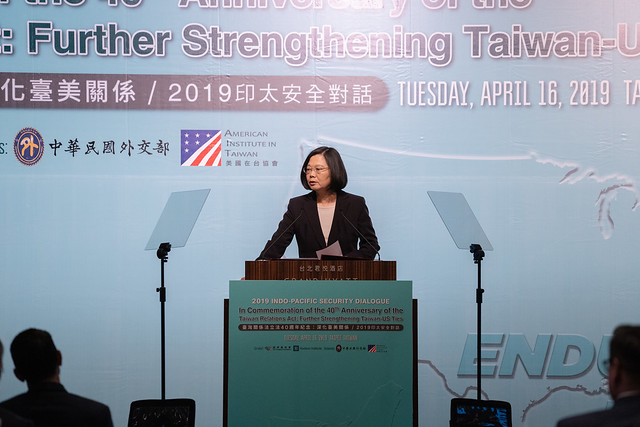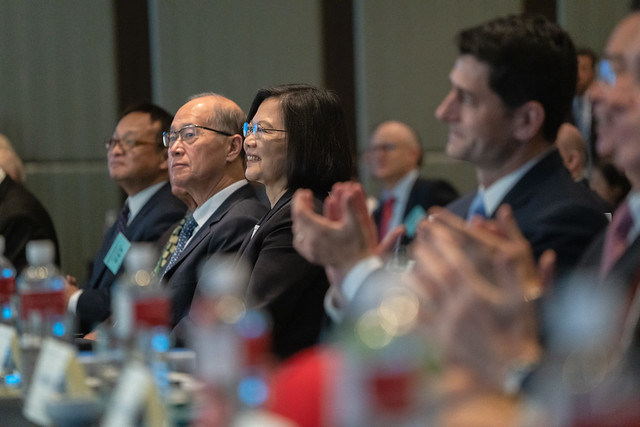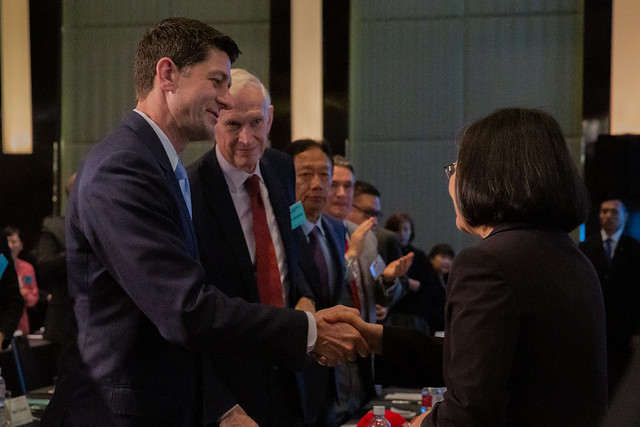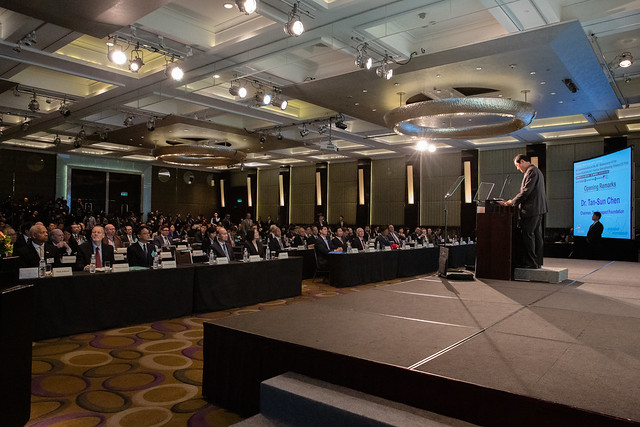News & activities
 News releases
News releases
President Tsai Ing-wen attended the opening ceremony of the 2019 Indo-Pacific Dialogue on the morning of April 16. She emphasized that as a full partner in the United States' Free and Open Indo-Pacific Strategy, Taiwan is also ready, willing and able to do more in the Indo-Pacific and beyond. The president also expressed hope for working together with the United States to forge a new era in the Taiwan-US partnership.
A transcript of President Tsai's remarks follows:
Thank you. Good morning. It's good to see Chairman [James] Moriarty, Director [William Brent] Christensen, and Head of this year's delegation former Speaker Paul Ryan [former US House Speaker]. And we have got so many new and old friends of Taiwan at this year's Indo-Pacific Dialogue.
Let me first acknowledge the efforts of Chairperson [Mark] Chen (陳唐山), and his team at the Prospect Foundation. My thanks also go to Hudson Institute for co-hosting this event. Thank you all for making today's event possible.
I also want to offer a special welcome to the head of the US Congress delegation, Speaker Ryan, and Congressmen Hank Johnson, Don Bacon, and Salud Carbajal. Your visit testifies to the strong friendship shared by Taiwan, and the members of Congress.
Yesterday we were at AIT's new compound. The new compound is beautiful, and I promised Brent that I would not tell you how many years it took them to complete the construction. We commemorated a milestone in the Taiwan-US partnership: The 40th anniversary of the Taiwan Relations Act (TRA).
If the authors of the TRA could look back over the past four decades, I'm sure they would be proud that we have stood by each other through thick and thin, and that we are now working together to promote a more prosperous and stable world.
They would also be proud to see that the spirit of the TRA is still alive today. So we saw the Taiwan Travel Act and Asia Reassurance Initiative Act passed in 2018, and the Taiwan Assurance Act that was proposed this year.
That legislation is a testament to our joint efforts to acknowledge Taiwan's strategic importance, and underscores Taiwan's relevance in the international community. Because we know that in world affairs, we can amplify our collective power and reach, by aligning ourselves with like-minded friends from around the world.
To meet the increasingly complex challenges around the world, we need an overarching strategy to strengthen our partnership.
That strategy can shape our shared future, through our shared economic security, regional security, and regional engagement.
Economic diversification and international ties are helping Taiwan enhance economic security. We have been fortunate to attract American tech giants like Google, Microsoft, and Amazon to invest in Taiwan. And Taiwan had the largest delegation to the SelectUSA Investment Summit in June last year.
I am particularly pleased that Chairman Terry Kuo (郭台銘) is with us today. He and his team at Foxconn all play an indispensable role in cementing Taiwan's position in the global economy.
So Taiwan is already a crucial link in the US high-tech supply chain, and an important partner for many American companies in the region, and around the world. I trust everyone here agrees that it is important to ensure global supply chains are jointly supported by like-minded friends.
And we trust everyone here agrees how important trade deals are in driving global growth. So I am confident that given our complementary economic ties, a trade deal is in the best interests of both Taiwan and the United States. That deal can be a model for the rest of the Indo-Pacific region, reflecting our shared values, and belief in a free and fair trading system.
Regional security is another key aspect of the Taiwan-US partnership, because Taiwan's freedom and democracy are key factors in our ability to continue to play a critical role in guarding our shared values.
To do our part, we have made great progress in reviving our defense industries, and creating more opportunities for collaboration with US defense manufacturers. And I am quite confident that more sales are in the pipeline.
We have also made good progress with our Indigenous Defense Submarine project – something that few people thought possible just a few years ago. I'm very pleased that phase one of that project is now completed.
And over the past three years, we have also seen a steady stream of arms sales under the current US administration.
Those sales help give us the capacity to defend our democracy, free market, and way of life. They are also a good investment in maintaining peace and stability across the Strait.
As you may be aware, China's armed forces yesterday sent a large number of military aircraft and naval vessels into our vicinity. Their actions threaten Taiwan and other-like minded countries in the region.
As President, I want to tell you that Taiwan is not intimidated. These actions only serve to strengthen our resolve. Our military forces have the capacity, determination, and commitment to defend Taiwan and not allow coercion to dictate our own future.
At this critical moment, we have received notification of the Trump administration's third arms sale to Taiwan. This arms sale is on the training of our Air Force pilots in Luke Air Force Base in Arizona.
It trains our pilots to be the same caliber of their American colleagues. It enhances their abilities to defend our air space. I want to express my appreciation to the US government for the announcement. I look forward to seeing our best and brightest receive the best training in the world.
As a full partner in the United States' Free and Open Indo-Pacific Strategy, Taiwan is also ready, willing and able to do more in this region, and beyond.
Last month, we held the first regional dialogue on religious freedom. We also announced the launch of our Indo-Pacific Democratic Governance Consultations. These events will be platforms to advance good governance and human rights in like-minded countries.
In addition to our security and strategic cooperation, we also see tremendous potential for business collaboration.
We are engaging with the US Overseas Private Investment Corporation, and exploring ways for both Taiwan and US companies to contribute to infrastructure development in Southeast Asia, and in our diplomatic allies. We are also engaging on how our New Southbound Policy can complement that strategy.
So as you can see--we are making great strides on all fronts. Like those members of Congress who pushed for the Taiwan Relations Act forty years ago, we are not leaving challenges for tomorrow. We are working to overcome those challenges today.
And so even as we renew our bonds of friendship, we must also forge a new era in the Taiwan-US partnership. I trust today's Dialogue is a chance to discuss how to move our partnership forward together. And I am sure our joint efforts will continue to play a key role in creating a better tomorrow for all. Thank you.
After concluding her remarks, the president took questions from the media outside the event venue, and talked about the US State Department's approval of an arms sale package for Taiwan worth hundreds of millions of US dollars. The announcement of this arms sale was quite timely, she said, especially after the PRC military actions we saw yesterday. Whether by air or by sea, the PRC military's deployment of fighter jets and naval vessels is a serious blow to regional and cross-strait stability—something a responsible regional power should not do. At the same time, we are very grateful that our brothers and sisters in uniform kept the PRC intruders under surveillance, and had the situation firmly in hand, strengthening our confidence in our ability to defend the nation. President Tsai once again emphasized that, "We will not cede an inch of territorial sovereignty, and will never forsake our democracy and freedom."
President Tsai pointed out that the United States announced an arms sale package for Taiwan and would continue to provide Taiwan with the training program for our air force pilots at Luke Air Force Base in the United States. She said that we hope to enhance the quality of our pilots and continue to maintain stability, and put them on a par with the most outstanding air forces in the world, which is critical for our national defense.












